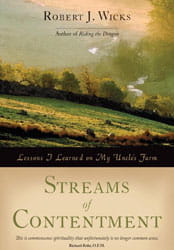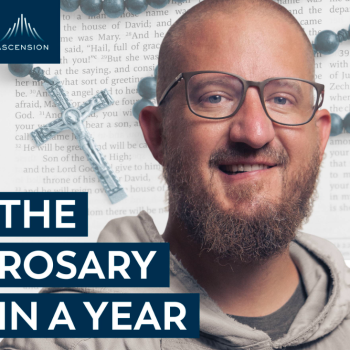This month at the Patheos Book Club, we're hosting a conversation on Streams of Contentment: Lessons I Learned on My Uncle's Farm, by Robert Wicks, professor of psychology at Loyola University in Maryland and author of the best-selling Riding the Dragon. Combining storytelling and spirituality, Wicks travels back through his life to the boyhood summers spent on his Uncle's farm to uncover spiritual wisdom for our time.
Whether you live on a bucolic farm or in the bustle of New York City, Wicks offers practical and life-sustaining suggestions for how to find contentment in the everyday. Richard Rohr, a popular author and speaker, says of the book: "This is commonsense spirituality that unfortunately is no longer common sense."
We invited Wicks to respond to some questions about his new book and to help us think about how to find contentment in our busy lives.
This book is a walk down memory lane to the days of your childhood summers on a family farm in the Catskill Mountains. What was it about those summers that formed you, and continue to "in-form" you today?
The simplicity of those days remain with me. I was mindful and didn't know what mindfulness was all about. I was present to whatever I was doing rather than either in the silver casket of nostalgia or unnecessarily preoccupied with the future. The people I was with were the only people in the world for me at that time; I was truly present. It was and is a template for my life now and for my work with others.
 Why did you decide to write this book now?
Why did you decide to write this book now?
The world, families, and many people seem to be in a tough place today. The lessons I learned during those summers on the farm I have used—sometimes without being conscious of it—in my work as a therapist, supervisor, and mentor with physicians, nurses, psychologists, educators, counselors, corporate executives, members of the military and persons in ministry I felt were worth sharing with a broader population given today's stresses.
What is your definition of contentment?
Contentment is the ability to be grateful enough to appreciate what is already in your life and having a willingness to both enjoy it yourself and share it with others.
Who is your ideal reader for this book?
Someone who is both open and ready to look at simple and powerful themes and then find ways to incorporate them in their lives. There really are no "new" concepts being presented here; the goal I set myself was to dust off what I believe is really important for a contented, meaningful, compassionate life so others could look at how they are evident or missing in their own lives. If you are looking for advanced theories or approaches, you will be unhappy with the book; on the other hand, if you wish to sit back, relax, and travel through stories and review practical ways of making the most out of your life, Streams of Contentment I think will deliver what the reader had hoped in picking it up.
The subtitle of the book is "Lessons I Learned on My Uncle's Farm." Is there one lesson that stands out for you as most important? And what do you think the hardest lesson to learn and practice is?
Yes. The opening chapter, which speaks about "the 3 calls" I believe all of us meet at certain points in our life. Knowing about them can make all the difference in how contented and compassionate one can be. If there is an original framework in this book, this is my contribution to helping people reflect on what true self-understanding and definition, pruning and surrender, and transformation mean for me.
The interesting thing about the calls for me are, is that I feel you should not move any faster through them than is possible. To try to do so would be a mistake. Timing and readiness are crucial. Trying too hard can also be a block. What I am trying to say is reflected in the following dialogue between a young man and his spiritual director: "Father, if I join this spiritual community, how long do you think it would take for me to reach a new level in my inner life?" "Oh, 10 years," the Abba responds. "But what if I work really hard, how long then." "Ah, then it will take 20 years."
Do you have to be on a country farm, or somewhere else remote, beautiful and quiet to practice the lessons you suggest?
Oh, I don't have to think for a moment about the answer to that: Absolutely not! Although nature and a chance to enjoy alone time can be lovely for many. For others, it need not be the setting—as a matter of fact, it may have the opposite effect. The daughter of one author who wrote a book on solitude told her mother that she loved living in the city and then joked, "Besides, I am frightened of trees." The real importance is to have a place where you can lean back, breathe a bit, smile at your life, and be grateful. People run around all the time and see this as practical. Why running to your grace is sensible, I'll never know. Stepping back doesn't mean we do less but our motivations are different: we are active instead of busy; involved instead of overwhelmed. When we are mindful, and don't separate ourselves from spaces of quiet and solitude but instead enjoy them, then when we come to die, we will do it while we are living...not merely existing. (Obviously from my long-winded response, you can see how important I feel alonetime is.)





